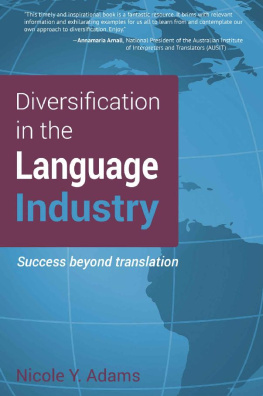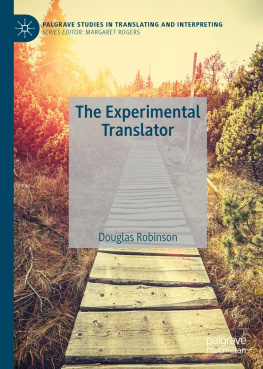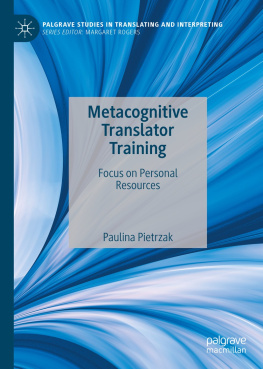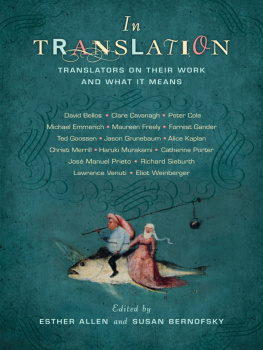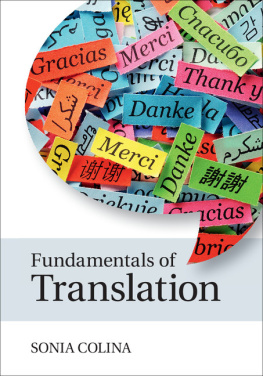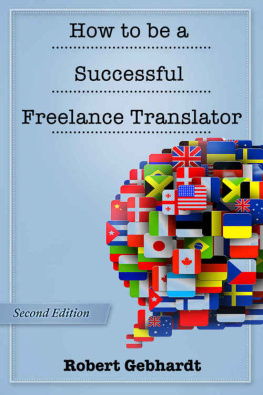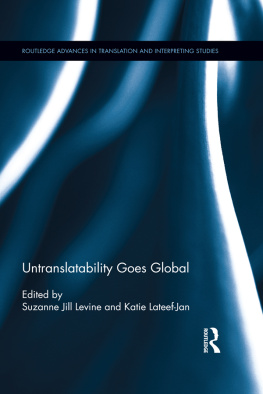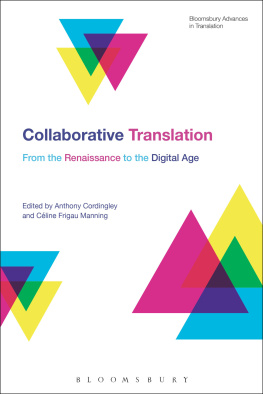Praise for Diversification in the Language Industry
Changes in technologies, procedures, requirements and roles affect us all, and the translator is certainly no exception. Typical professionals are likely to be kept up-to-date by their employers, but translators are often working on their own and must struggle to adapt. This collection of interviews and essays provides excellent advice from a whos who list of language professionals. It is a valuable resource for translators, from novices to mid-career professionals. With information from this book, translators can not only adapt but excel in these changing times.
Donna Parrish,
Editor-in-Chief, MultiLingual
Nicole Y. Adams has assembled an impressive array of translation-industry experts in this investigation into the implications of the very rapid pace of development that the industry is experiencing, and the opportunities that this presents for freelance translators. Contributions from authorities on topics such as machine translation, post-editing, subtitling, CPD, business skills, social media and public-speaking are interspersed with interviews with practitioners that provide an insight into what the theory means in the real world. In addition, a series of case studies takes an in-depth look at how some of the most distinctive examples of diversification succeeded in carving out their unique niche. Whether you think that diversification is a sign of the translation industry growing up, or you view it with fear and trepidation as an indication that the standards and status you are aiming for in your work are going to be severely diluted this book should help reshape your understanding of the term.
Iwan Davies MITI,
Freelance Translator and Chairman of the Institute of Translation & Interpreting (ITI)
Today, starting any kind of business has become easier than ever, but this also makes it harder for clients to choose their prospective service provider. What I love about this book is that it actually describes my own path to successful entrepreneurship. I learned along the way that my customers need more than just translation. [...] Nicole has felt the heartbeat of our industry in 2013. [...] Diversification is certainly a major issue in our industry!
Tanya Quintieri,
President of the German Association of Freelance Translators and Interpreters (DVD)
Freelance and translation have long been content bedtime partners. It was inevitable that a publication discussing diversification in the language industry would eventually appear. Particularly pleasing is the collective authors positive spin on how technological change, new mediums of communication are broadening and lengthening the translators field of opportunities.
Daniel Mueller,
Executive Officer of the Australian Institute of Interpreters and Translators (AUSIT)
Like electricity, water and the Internet, translation is becoming one of the basic needs of human civilization. In its current state the translation industry lacks the capacity, the skills and the vision to fulfil such a strategic role in the globalization of business and governance. Billions of new co-citizens and consumers on new continents speaking a thousand or more new languages are waiting to be served. Zettabytes of information (including more multimedia and speech) are waiting to be translated, faster and cheaper than ever before. Technically its possible. But it requires a paradigm shift, an open mind and an innovative spirit. Nicole Adams has done a great job showing the way to new opportunities and diversification in the language industry.
Jaap van der Meer,
Director of the Translation Automation User Society (TAUS)

Published by NYA Communications 2013
Copyright 2013 Nicole Y. Adams
All rights reserved. No part of this publication may be reproduced, stored in a retrieval system, or transmitted in any form or by any means, electronic, mechanical, photocopying, recording or otherwise, without the prior written permission from the publisher.
All material contained in this book is provided for educational and informational purposes only. The author takes no responsibility for any results or outcomes resulting from the use of this material. While every attempt has been made to provide information that is both accurate and effective at the time of publication, the author does not assume any responsibility for the accuracy and/or use or misuse of this information. Further, the author does not have any control over and does not assume any responsibility for third-party websites or their content.
Editor: Adele Anderson
Book cover design and formatting services by BookCoverCafe.com
www.nyacommunications.com
First edition 2013
ISBN: 978-0-9874777-3-6
When you come to a fork in the road, take it.
Yogi Berra
Contents
Foreword
D IVERSIFICATION IS AN economic necessity we hear increasingly these days. I would like to go further and propose that diversification can be a life-management necessity. Diversification in work is a wonderful approach to achieving a healthy balance between all those activities that we do trying to lead a successful and fulfilling life. Adding variety to what we do to earn a living can have a hugely beneficial impact on the entirety of that living.
It is often said that translation is an art and a craft; an intellectual pursuit equated to dancing on a tightrope whilst your arms and legs are hobbled. Good translation is celebrated for the feat it amounts to of transferring complete meanings within strict boundaries. Your mind and heart are engaged in this pursuit, but is your creativity able to operate at its most fundamental level? No. When you are translating, you are expressing other peoples thoughts. You choose the words and you erect the structure, but you cannot have any input into the meaning. It is someone elses meaning, someone elses message. When you translate, you must not have a message of your own. This self-denial aspect of the job is rarely pondered, yet also significant. Diversification is a way to free your ego from the constant repression. When you are engaged in your other-than-translating job, you can generate new ideas, you can let your inventiveness soar where it would, and you reap economic and self-affirmatory rewards.
Translation is solitary work. Isolation might suit some of us just fine for some of the time, but when we are asked about the negative aspects of our occupation we tend to complain that there are limited opportunities for us to interact with peers and the outside world. This is one of the reasons that we join professional associations. AUSIT, the Australian Institute of Interpreters and Translators Inc., has conducted member satisfaction surveys twice during the past few years. Results revealed on both occasions that the most highly praised service AUSIT offers to its members is the connection to a community. Electronic correspondence lists, face-to-face meetings and various networking events facilitate the spread of thoughts and ideas. These confirm our worth and contribute in innumerable practical ways to our personal, professional and economic growth. Participation in the life of a community enables us to help others and also to ask and receive assistance when we need a hand. For most of us, AUSIT is a circle of friends who are also colleagues.
Nicole Adams, the author of this timely and inspirational book, is an AUSIT member; so is the editor, Adele Anderson. Several contributors in fact, almost everyone from Australia also belong to our organization, which warms my heart and gives me enormous pride. AUSIT seems to be fulfilling its role as a community where the avant-garde of the profession comes together and cheerfully unites to influence the future.
Next page
